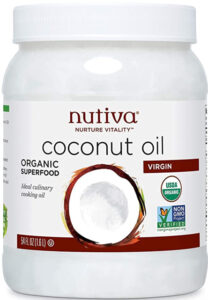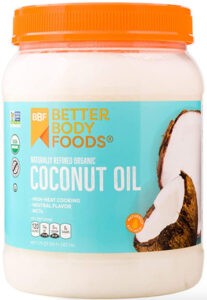In 2003, medical doctor Mary Newport’s husband Steve, then only 53 years old, started showing signs of dementia, and was later diagnosed as being in the severe stages of Alzheimer’s. He was put on several medications to help slow the progression of the disease, but he continued to decline. Dr. Newport watched her husband of 36 years simply fade away.
Behind cancer, Alzheimer’s is the second greatest health fear among Americans. It is a frightening disease characterized by failing memory, erratic behaviors and loss of bodily functions. It slowly takes away a person’s identity and their ability to think, eat, talk, and walk. There is no cure and there is no definitive cause. Doctors don’t even know how to stop or even prevent the tragic disease that is currently destroying the lives of 5.3 million Americans.
But Dr. Newport, a neonatologist and medical director of the newborn intensive care unit at Spring Hill Regional Hospital in Tampa, Florida, could not accept her husband’s ill fate, and decided to take matters into her own hands. She began researching the science behind Alzheimer’s and what happens in the brain cells of people who suffer from the disease. During that research she discovered clinical results from a new medication being tested that had effectively stopped the progression of Alzheimer’s disease and showed actual memory improvement. No other Alzheimer’s medications have shown actual memory improvement – only that they can slow the progression of the disease.
In the new medication’s patent application, she found an in-depth discussion of its main component – medium chain triglycerides (MCTs) from coconut oil. Dr. Newport began adding coconut oil to Steve’s diet, and saw immediate and dramatic results, which she later documented in her book Alzheimer’s Disease: What If There Was A Cure? (Basic Health Publications, October 2011). This five-minute video gives an overview of Dr. Newport’s experience with using coconut oil as a dietary intervention for Alzheimer’s.
If you have read my books or taken my classes, you know that I am a strong advocate for coconut oil, and I have been teaching about its virtues for nearly a decade. Of all the health-promoting fats, coconut oil is uniquely curative, providing health benefits that surpass even those of other highly regarded oils. Over the last decade, a growing body of research is proving scientifically what traditional coconut-eating societies have known for thousands of years: coconut oil is not only a valuable and delicious food, but also a powerful medicine.
Among its innumerable health benefits, coconut oil has been shown to protect against heart disease, cancer, diabetes, osteoporosis, and a host of other degenerative diseases. It also raises good (HDL) cholesterol, improves thyroid function and facilitates weight loss. It strengthens the immune system and destroys a wide array of serious viruses and bacteria, including measles, shingles, herpes, and HIV.
Most of coconut oil’s virtues come from medium chain triglycerides (MCTs), which comprise about 60 percent of it composition. In clinical studies MCTs have produced better results in Alzheimer’s patients than any other treatment currently known.
In healthy people, the brain’s cells absorb glucose (blood sugar) and convert it into energy that fuels the brain. But brain cells in Alzheimer patients have developed a form of “glucose resistance” – the inability of the brain to effectively utilize glucose to produce energy. Alzheimer’s is essentially a type of “diabetes of the brain” that begins 10 or 20 years prior to noticeable symptoms. This defect in energy conversion starves the brain cells and they die. When brain cells die, the brain rapidly ages and degenerates into dementia.
Most of the glucose our bodies need is derived from carbohydrates in our foods. However, the body has a back-up plan for fueling the brain when glucose levels are low, such as during a fast or when following a low carbohydrate diet, and even during starvation. This alternative fuel source comes in the form of ketone bodies or ketones. Ketones are a special type of high-energy fuel, produced from fat stored in the liver, specifically to nourish the brain. Under normal conditions, only a small amount of ketones circulate in our blood, but as blood glucose levels go down, ketone production steps up. This way the brain has a continual supply of either glucose or ketones to rely on.
Extremely low-carbohydrate, high-fat diets are called “ketogenic” diets, and have been used for over 90 years to successfully treat epilepsy, another degenerative brain disease. However, following such a diet is difficult and impractical long term, and is not healthy. It is also not necessary. The MCTs in coconut oil are easily converted to ketones in the liver. Two tablespoons of coconut oil can produce enough ketones to have a significant effect on brain function. Coconut oil is the source of the MCTs used in Alzheimer’s studies and to produce pharmaceuticals.
Dr. Newport proved that coconut oil alone or in combination with MCT oil can effectively stop the progression of Alzheimer’s disease and reverse the symptoms. But the Newports are not the only people who have found positive results with ketones. In his groundbreaking book, Stop Alzheimer’s Now!: How to Prevent & Reverse Dementia, Parkinson’s, ALS, Multiple Sclerosis & Other Neurodegenerative Disorders (Picadilly Books, February 2011), Dr. Bruce Fife, a leading expert on coconut oil research, offers a wide array of documented scientific findings on the therapeutic use of coconut ketones.
I want to add a few of my own words about the video: Although the source of the video is from a religious news station, I do not endorse any ideology. There are other videos of interviews with Dr. Mary Newport and her husband available for you to watch on YouTube, however I found this one to be the most succinct and interesting, and that is why I chose to offer it here.
Also, there is a particular brand of coconut oil that is prominently staged in the video, and I do not endorse that brand. It is a refined, bleached, and deodorized coconut oil that has been processed at high temperatures. I don’t doubt that the manufacturer of that coconut oil paid for placement, but it is the brand that Dr. Newport says she used in her husband’s diet. While it may work for producing ketones in the body to improve memory, it lacks the other important nutrients, such as minerals and antioxidants, that are responsible for coconut oil’s other numerous health benefits. Below I have some recommend brands of extra virgin unrefined coconut oil.
Finally, while adding coconut oil into the diet can have a remarkable effect on brain health, Dr. Bruce Fife explains that coconut ketones alone are not the complete solution. Diet also affects brain health. What you eat can either enhance the effectiveness of ketone therapy or interfere with it. An improper diet can sabotage the beneficial effects produced by coconut ketones. This explains why some Alzheimer’s patients who have simply added coconut oil without making any other changes to their diets have experienced only modest improvement. Some foods and food additives promote neurodegeneration.
A processed-free diet low in complex carbohydrates from vegetables, fruits and whole grains, rich in healthy fats including omega-3 stop Alzheimer’s dead in its tracks and bring about substantial improvement. Dr Fife’s book and Dr. Newport’s book and website provide details on how to use coconut oil along with a proper diet to successfully combat Alzheimer’s and other neurodegenerative disorders.
DEE’S RECOMMENDATIONS FOR COCONUT OIL
Sources:
1. Bruce Fife, ND , Conquering Alzheimer’s with Coconut Ketones
2. Eve Hosley-Moore, “Doctor says an oil lessened Alzheimer’s effects on her husband,” Tampa Bay Times, October 29, 2008





